| Srl | Item |
| 1 |
ID:
108181
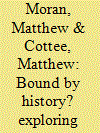

|
|
|
| 2 |
ID:
143594
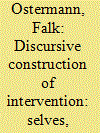

|
|
|
|
|
| Summary/Abstract |
This article analyses French executives' and lawmakers' legitimisations of the intervention in Libya with the aim of understanding the discursive construction of intervention. It investigates the arguments in favour of intervention and the oppositions they were confronted with. To these arguments belong a re-evaluated democratic legacy of France, an identification with the Libyan people, and a debate on Responsibility to Protect and the rule of law in world politics, which have a broader relevance for French actorness abroad. The article applies the Essex School discourse theory and techniques from Interpretive Policy Analysis on executive speeches and parliamentary documents for structuring the debate and for estimating the strength of ideas in their interdiscursive configuration. An ideal-typical explanation of the legitimisation of intervention and of the choice of one policy over another is made. The article argues that going to war in Libya equated to a question of cultural appropriateness.
|
|
|
|
|
|
|
|
|
|
|
|
|
|
|
|
| 3 |
ID:
122246
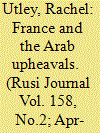

|
|
|
|
|
| Publication |
2013.
|
| Summary/Abstract |
The consequences of the upheavals across the Middle East and North Africa since December 2010 have posed a significant foreign-policy challenge to France, which has historically distinguished itself from other major Western powers by maintaining a closer relationship with the Arab states, and its former colonies, in this region. Despite this familiarity, however, the incoherence of the French response under President Sarkozy to the turbulence that unfolded early in 2011 suggests that it was caught unawares and, despite apparent success in Libya, Sarkozy's successor Hollande continues to grapple with the impact on French influence in the region.
|
|
|
|
|
|
|
|
|
|
|
|
|
|
|
|
| 4 |
ID:
119491


|
|
|
|
|
| Publication |
2013.
|
| Summary/Abstract |
Nicolas Sarkozy's presidency presented a mixed record on the issues of Muslim immigration and integration. On the one hand, his administration took novel and constructive steps to advance the integration of Muslim immigrants into French society, notably through the granting of unprecedented official recognition and institutional representation to Islam in the country. On the other, by placing the immigration issue at the centre of his 2012 re-election strategy, he overshadowed and undermined the effectiveness of these integrative policies. Given the country's worsening economic outlook and rising unemployment, immigration is therefore likely to remain as salient and difficult an issue under the new Hollande administration as it was under Sarkozy's.
|
|
|
|
|
|
|
|
|
|
|
|
|
|
|
|
| 5 |
ID:
111596


|
|
|
|
|
| Publication |
2012.
|
| Summary/Abstract |
This article elaborates the notion of 'nuclear idiosyncrasy' as a specific understanding of what nuclear weapons and energy are, what they stand for and what they can do. It then assesses the persistence of nuclear idiosyncrasy over time and its effects on French nuclear policies in the United Arab Emirates (UAE) and Iran. Based on interviews in France, Geneva and the UAE, this article contributes to three debates within foreign policy analysis and nuclear history. Is a regional approach necessary to understand the framing of foreign policies in the twenty-first century? Does a change in leadership fundamentally affect the orientations of nuclear policies? Are the risks of nuclear proliferation in the Middle East and the measures to prevent it similarly understood by all the players in the international community? First, it shows that French nuclear policies in the Middle East are not shaped by dynamics specific to the region as the often invoked notion of an 'Arab policy of France' would suggest. Secondly, in-depth analysis leads one to reject the idea of a major change between the nuclear policies of Presidents Chirac and Sarkozy. Thirdly, persistent French nuclear idiosyncrasy leads also to rejection of the idea of convergence towards a shared understanding of the proliferation threat in the Middle East.
|
|
|
|
|
|
|
|
|
|
|
|
|
|
|
|
| 6 |
ID:
092488
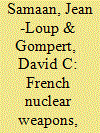

|
|
|
|
|
| Publication |
2009.
|
| Summary/Abstract |
Changes in French nuclear weapons policy are in the air. In 2006, President Chirac proposed that France expand the purpose of nuclear deterrence beyond defending French territory to include protecting France's European allies(Euro-deterrence); securing certain vital French interests, such as oil supplies; and holding at risk states that support terrorism.
|
|
|
|
|
|
|
|
|
|
|
|
|
|
|
|
| 7 |
ID:
119306
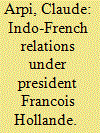

|
|
|
| 8 |
ID:
094372
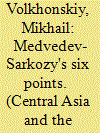

|
|
|
| 9 |
ID:
107100


|
|
|
|
|
| Publication |
2011.
|
| Summary/Abstract |
THE ONGOING UNREST IN ARAB COUNTRIES has been at the center of international attention for months. The "Arab spring" has a different color in each Middle Eastern and North African country. Nevertheless, the causes of crisis are similar in each country. They include unsolved domestic problems such as the lack of legal and clear mechanisms of power rotation that would be accepted by society; economic and political stagnation; poverty (absolute or relative) of the overwhelming majority of the population despite the enormous incomes of the political elite; corruption; and unemployment. These crises are interdependent to a certain extent, which has led people to compare them to a "domino effect.
|
|
|
|
|
|
|
|
|
|
|
|
|
|
|
|